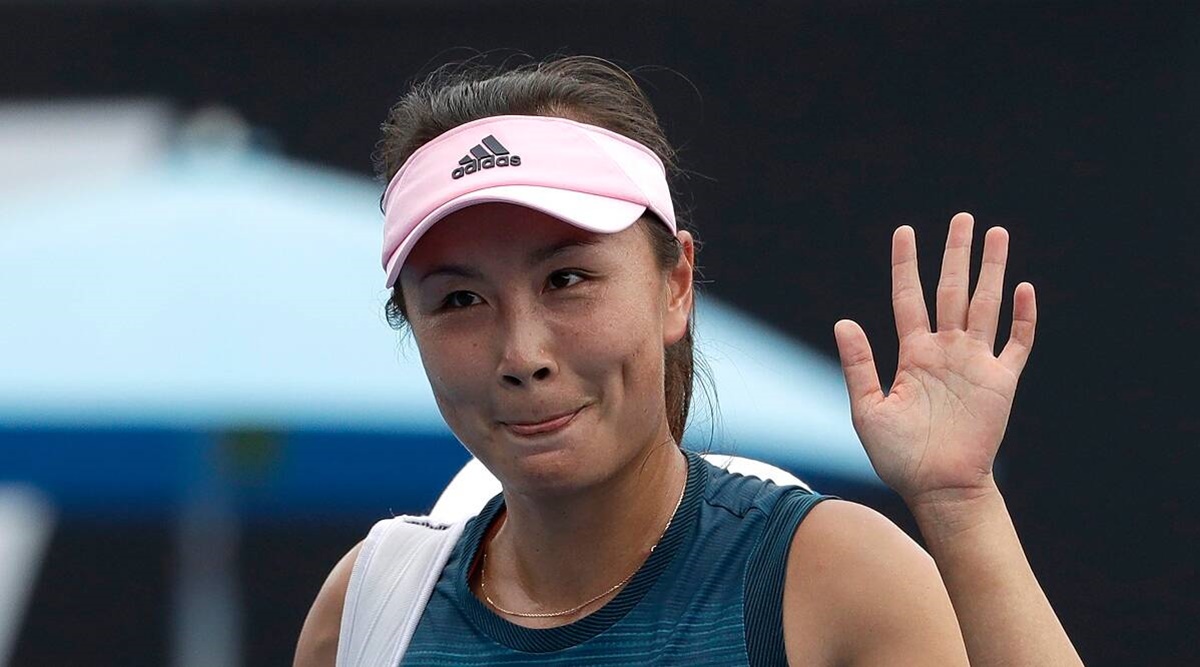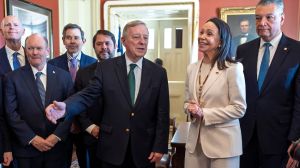Explained: What does WTA stand to lose after pulling out of China
🔴 Tennis players and the likes of the United Nations and Amnesty International have echoed calls for Shuai’s allegations to be investigated transparently, and that her safety be ensured.
 Former World No. 1 doubles player Peng Shuai. (AP/File)
Former World No. 1 doubles player Peng Shuai. (AP/File)Late on Wednesday, a month after former World No. 1 doubles player Peng Shuai went missing, the Women’s Tennis Association (WTA) decided to withdraw from all activities in China. The two-time Grand Slam champion had posted on social media the allegation of being sexually assaulted by former Chinese vice-premier Zhang Gaoli. However, the post was deleted almost immediately, and internet searches regarding Shuai, and also ‘tennis,’ were blocked in the country. There has been speculation about Peng’s whereabouts and safety ever since.
Tennis players and the likes of the United Nations and Amnesty International have echoed calls for Shuai’s allegations to be investigated transparently, and that her safety be ensured. The WTA, though, has now decided to pull the plug on its operations in China – becoming the first sporting body to take the step in the East Asian country.
“With the full support of the WTA Board of Directors, I am announcing the immediate suspension of all WTA tournaments in China, including Hong Kong,” WTA chief Steve Simon said in a statement.
What is at stake for the WTA?
China offers a strong market for any sport. In 2018, the WTA signed a record 10-year deal – worth $1 billion according to SportsBusiness Journal – to host its year-end event in Shenzhen. In the 2019 calendar year – the last season before the pandemic wreaked havoc on the schedule – the WTA had 10 events in China with a total prize purse of $31,033,118.
The body will now have to relocate those 10 tournaments to other venues which may or may not be able to offer the same prize money.
Has the ATP done anything in the Peng case yet?
Players from the men’s association have applauded the WTA’s move, but the body itself has not done much beyond issue a statement a few weeks ago calling for a “fair and transparent investigation” into Shuai’s claims.
Like the WTA, the ATP too has significant business interests in China – perhaps of greater monetary value. The four ATP events held in China in 2019 – including the Shanghai Masters 1000 – had a prize sum of $14,202,455. The ATP also had numerous Challenger events held in China before the pandemic struck.
What about the International Olympic Committee?
Curiously, the IOC has been the only body that has seemingly made contact with Shuai. The body had released a photograph of its president Thomas Bach on an apparent 30-minute video call with Shuai, and claimed that the three-time Olympian was safe. Footage of the actual call was not released, and the WTA was not convinced about Shuai’s safety.
Shortly before the IOC’s alleged videocall, the body opted not to take any action into Shuai’s disappearance, telling CNN: “Experience shows that quiet diplomacy offers the best opportunity to find a solution for questions of such nature.”
It’s also important to understand that in February, the IOC will be hosting the Winter Olympics in Beijing, and Gaoli was, according to CNN, the face of the organising committee for the upcoming Games.
 Peng Shuai, a three-time Olympian and former top-ranked doubles player, dropped out of public view after accusing former vice-premier Zhang Gaoli of sexual abuse. (AP)
Peng Shuai, a three-time Olympian and former top-ranked doubles player, dropped out of public view after accusing former vice-premier Zhang Gaoli of sexual abuse. (AP)
In a fresh statement, the IOC claimed to have had a second call with Peng, in which the tennis player “reconfirmed” that she is safe and well, given the “difficult situation” she is in. However, no visual proof of the second call was provided.
WTA has taken a stand, but why did the NBA apologise to China?
In 2019, amidst protests in Hong Kong, former Houston Rockets general manager Daryl Morey tweeted in favour of the protesters who were fighting “for freedom.” Immediately, the post was deleted but the Rockets started to lose sponsors, and team merchandise was no longer up for purchase in China. The NBA too suffered as China’s main broadcaster removed all the franchise’s matches from the programme.
The NBA has raked in billions from China – starting from the 2019 deal it struck to stream games in the country for five years, a tie-up worth $1.5 billion. After Morey’s tweet though, state-run CCTV banned NBA matches from being aired, costing the sports group $400 million, according to Forbes.
Morey issued an apology to China, which LeBron James, who is generally vocal against human rights atrocities, sided with. Then Rockets’ star player James Harden too apologised to China.
“We apologise. We love China, we love playing there,” Harden said to reporters at the time.
Has the Chinese government exercised its influence in football also?
Yes. According to German publication Deutsche Welle, Chinese officials deemed that the amount of investment required outweighs the returns, prompting the government to dissuade investors from entering the sport. This had an impact in China – where the Super League started to dwindle – and abroad. In 2017, there were 20 European clubs with Chinese owners, but that dropped to 10 by 2021.
La Repubblica, an Italian daily, reported that Inter Milan owners from China, Suning Holdings, was also looking to sell its stake in the club.
How does China use sports as a tool of government policy?
The country has been pumping in billions into developing sporting infrastructure in the country. State broadcaster CGTN claimed in 2019 that China spent $3.9 billion for the Winter Olympics, which will be held the same year the country hosts the Asian Games. Bloomberg also reported that the country is planning to invest $773 billion by 2025 into its sports industry.
China is also a leading manufacturer of sports goods – particularly in table tennis.
Last month, Formula One also extended its contract with China to 2025.
Newsletter | Click to get the day’s best explainers in your inbox
- 01
- 02
- 03
- 04
- 05






































